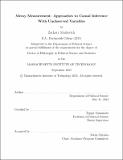Messy Measurement: Approaches to Causal Inference With Unobserved Variables
Author(s)
Markovich, Zachary
DownloadThesis PDF (2.005Mb)
Advisor
Yamamoto, Teppei
Terms of use
Metadata
Show full item recordAbstract
This dissertation focuses on methods for conducting causal inference when an essential variable is unobserved. The first paper provides new methods for causal inference with bundled variables. A bundled variable is one that, rather than being observed directly, is instead represented as a collection of proxies present in the dataset. The only existent approach to causal inference in this setting is to dimension reduce the proxies, thereby recovering the missing treatment or moderator. The first paper of this dissertation provides a new method for quantifying the causal effect of the full bundle, thereby sidestepping this missing data problem. The second paper provides a new method for analyzing randomized experiments with non-compliance. Researchers typically attempt to estimate the treatment effect only among compliers in such cases, but compliance status is not directly observed, so instrumental variables methods are used instead of directly conditioning on compliance. I propose an alternative estimator based on upweighting units that are likely compliers. I show that this estimator is asymptotically conservative under weaker assumptions than instrumental variables models require. The final paper (joint with Ariel White) turns to an applied causal inference task and focuses on the effect that minimum wage increases have on the probability of voting. Because receiving a pay raise due to a minimum wage increase is confounded by income and socio-economic status (which goes unobserved), we employ a difference-indifferences design that provides credible causal evidence that minimum wage increases raise the turnout rate of affected workers.
Date issued
2023-09Department
Massachusetts Institute of Technology. Department of Political SciencePublisher
Massachusetts Institute of Technology